Source: Vernacular Blockchain
Since Trump won the presidential election on November 5, 2024, the price of Bitcoin has soared. Just one month later, Bitcoin broke through the $100,000 mark, setting off a new round of market enthusiasm.
Behind the carnival, it is inseparable from a series of crypto-friendly statements made by Trump during the campaign. He clearly promised that if he came to power, he would strongly support the development of the crypto industry, saying that he would make the United States the "global cryptocurrency capital" and declared that he would establish a "Bitcoin strategic reserve". In addition, Trump also announced the crypto platform supported by his family-World Liberty Financial (WLFI).
Just a few days before Trump took office, a Memecoin called "Trump" turned out, and with the title of the President of the United States, it quickly attracted the market's frenzy of attention, and also attracted a large number of new investors to enter the market with the "breaking circle" effect, pushing the craze of the crypto industry to a new height.
On January 20, Trump was officially sworn in. At the same time, a group of crypto-friendly officials nominated by him also arrived one after another. Among them, on January 23, Republican Senator Cynthia Lummis, who proposed the Bitcoin Act, was appointed as the chairperson of the Senate Banking Digital Assets Subcommittee. CZ said, "The Bitcoin reserve is basically determined."
In addition to Lummis, what other heavyweights are there in this lineup known as the "Crypto Dream Team"? How will they affect the future of the crypto industry? Let's find out.
01 Crypto-friendly SEC Chairman
As we all know, the SEC has a long history of grievances with cryptocurrencies. As an agency under the US government that regulates the stock market, the SEC has formulated securities registration rules and supervised their implementation with the aim of maintaining transaction transparency, combating fraudulent schemes, and protecting investors' confidence in the stock market.
The SEC's regulation of the crypto industry dates back to 2013, but as cryptocurrencies have grown, the intensity of regulation has also increased. In recent years, all major regulatory projects in the industry have been related to the SEC, including the Ripple lawsuit, the collapse of FTX, and the fine of BN.
On the second day after he was sworn in, that is, the second day after former SEC Chairman Gary.Gensler left office, Trump announced that SEC Republican Commissioner Mark T. Uyeda would serve as acting chairman until Paul Atkins (Trump's official nominee to replace Gensler) completes the Senate confirmation process.On the same day, Mark announced the establishment of a cryptocurrency working group to develop a clear and clear regulatory framework for U.S. crypto assets.
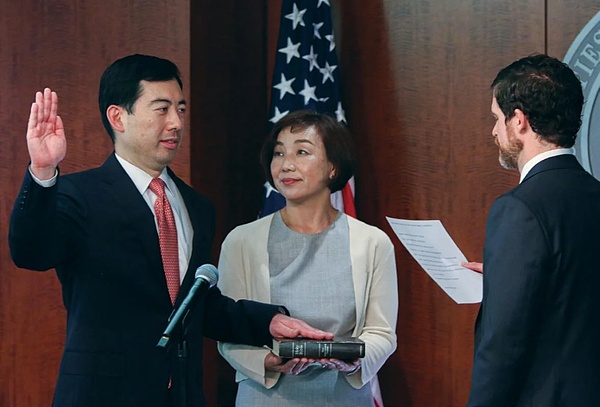 Mark Uyeda (first from left) was sworn in as acting chairman of the SEC, source: YouTube
Mark Uyeda (first from left) was sworn in as acting chairman of the SEC, source: YouTube
From the official statement of the SEC, it can be learned that Mark has a rich educational background and career experience. He worked as a lawyer in Washington and Los Angeles, then joined the California securities regulator, and served in several senior positions in the Trump administration. At the SEC, he held several important positions and finally became an SEC commissioner in June 2022.
Although he is relatively low-key in the public eye, he is reportedly supportive of the development of the crypto industry.In his past work, he voted in favor of the review of crypto-related ETFs, and held a similar position with another commissioner, Peirce, on some decisions, advocating that the SEC should respond positively to the needs of the crypto industry and promote the formulation of clearer regulatory rules.
Previously, on December 4, 2024, Trump nominated Paul Atkins, who served as a member of the SEC during the Bush administration (2002-2008), as the next SEC chairman.
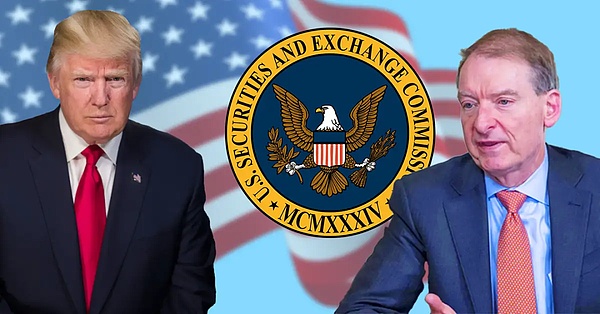 Atkins worked in securities issuance and mergers and acquisitions at a New York law firm. He joined the U.S. Securities and Exchange Commission (SEC) in 1990 and assisted several chairmen in formulating important regulations involving corporate governance, shareholder rights and capital market access. He has extensive legal and regulatory experience.
Atkins worked in securities issuance and mergers and acquisitions at a New York law firm. He joined the U.S. Securities and Exchange Commission (SEC) in 1990 and assisted several chairmen in formulating important regulations involving corporate governance, shareholder rights and capital market access. He has extensive legal and regulatory experience.
In recent years, Atkins has been supporting the development of the crypto asset industry.He served as co-chairman of Token Alliance to promote best practices for digital asset issuance and trading platforms; he also served as an advisor to the DeFi platform Reserve Rights Foundation. In 2022, he proposed allowing 401(k) pensions to invest in Bitcoin, believing that the potential of this asset class deserves to be accepted by more Americans.
In a podcast in early 2024, Atkins made his point clear: "We are heading into a transformational era for cryptocurrencies. As long as the government and the SEC are more inclusive and engage in direct dialogue with the industry, the future of the U.S. market will be brighter."He stressed that the SEC should support market innovation, reduce investor costs, and return to its core mission.
In addition to his support for cryptocurrencies, Atkins has criticized the unreasonable burden of the Dodd-Frank Act on the banking industry and advocated reducing government intervention in the market.
Ripple CEO Brad Garlinghouse affirmed Atkins' nomination, calling him "an excellent choice" and believing that he will bring a new atmosphere to the SEC. Although Atkins' personal holdings of crypto assets have not been disclosed, the market generally speculates that he may hold Bitcoin or other mainstream crypto assets.
At present, Atkins' appointment needs to wait for a vote in the Senate, which takes several months, and Mark will temporarily serve as acting chairman. In general, Mark Uyeda's acting chairmanship and Paul Atkins' formal nomination indicate that the SEC may usher in a more inclusive and proactive regulatory attitude. Whether this change can promote the balance between industry and policy will attract much attention.
02 Secretary of the Treasury who supports encryption
As a core department of the federal government, the U.S. Treasury Department is responsible for fiscal policy, currency issuance, tax management, financial market stability and combating money laundering. It also supervises anti-money laundering and terrorist financing, promotes digital dollar research, and influences the development and legalization of the encryption industry. In the United States, the Secretary of the Treasury is considered one of the "four important positions in the U.S. Cabinet" after the Vice President.
On November 22, 2024, Trump nominated billionaire Scott Bessent for the position of Secretary of the Treasury.
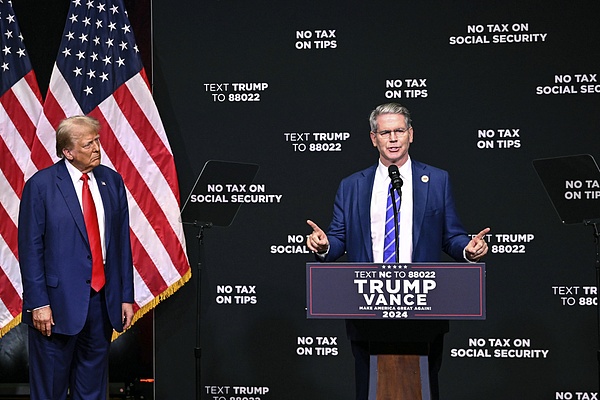 Bessant, 63, graduated from Yale University with a degree in political science. During college, he studied macroeconomics and financial instruments in depth. After graduation, he quickly emerged and served as the chief investment officer of Soros Fund Management. He has rich experience in market transactions and economic policy consulting. As a financial expert who publicly supports cryptocurrencies, Bessant has repeatedly called cryptocurrencies "an indispensable part of the future of finance." In an interview with Fox Business Channel in early 2024, he said: "Cryptocurrency represents freedom, and the crypto economy will continue to exist." He particularly emphasized that the most attractive thing about Bitcoin is that it attracts young people and people who have not participated in the market before. He believes that cultivating market culture and establishing a system that is more suitable for the masses is the core of capitalist development.
Bessant, 63, graduated from Yale University with a degree in political science. During college, he studied macroeconomics and financial instruments in depth. After graduation, he quickly emerged and served as the chief investment officer of Soros Fund Management. He has rich experience in market transactions and economic policy consulting. As a financial expert who publicly supports cryptocurrencies, Bessant has repeatedly called cryptocurrencies "an indispensable part of the future of finance." In an interview with Fox Business Channel in early 2024, he said: "Cryptocurrency represents freedom, and the crypto economy will continue to exist." He particularly emphasized that the most attractive thing about Bitcoin is that it attracts young people and people who have not participated in the market before. He believes that cultivating market culture and establishing a system that is more suitable for the masses is the core of capitalist development.
Trump once praised Bessant on the Truth Social platform, calling him "one of the world's most outstanding international investors and strategists," and said that Bessant's success story perfectly interprets the "American Dream." Trump also mentioned that on the 250th anniversary of the founding of the United States, he will work with Bessant to consolidate the United States' position as a global economic, innovation and capital center, while ensuring that the US dollar continues to serve as a global reserve currency.
As an important ally of Trump on Wall Street, Bessant not only provided financial support for his campaign, but also provided key advice for his policy making. However, Bessant's nomination has sparked mixed reactions in the industry. Ripple CEO Brad Garlinghouse called it a "victory for innovation" and believed that Bessant's joining will promote cryptocurrency-friendly policies. On the contrary, Elon Musk expressed disappointment with the nomination, criticizing Bessant as a "business as usual choice" and warning that it was this way of thinking that led "the United States to bankruptcy."
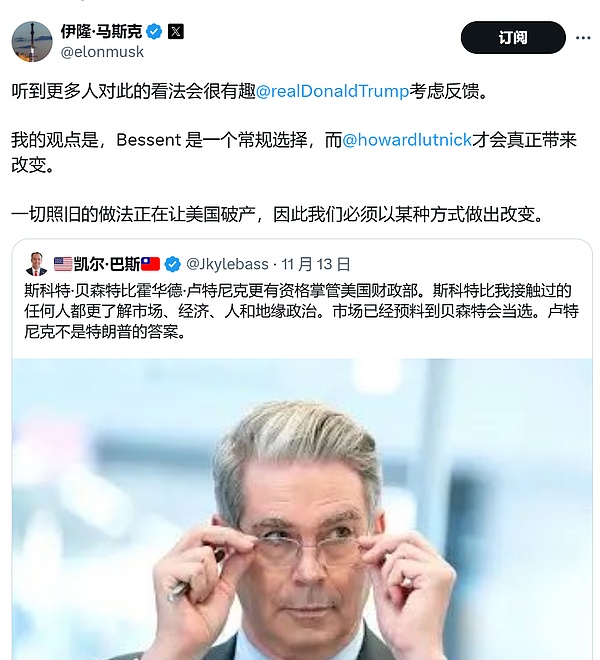
According to news on January 22, Mike Claypow, chairman of the Senate Finance Committee, expressed the hope that the Senate will vote on Scott Bessant, the Treasury Secretary nominated by US President Donald Trump, next week.
03 BTC Max's Secretary of Commerce
The US Department of Commerce is mainly responsible for promoting economic growth, increasing employment, promoting international trade and technological innovation, and plays a key role in strengthening the US semiconductor industry and reducing dependence on Asia. Although the Department of Commerce does not directly regulate the crypto market, it can still have an indirect impact on the security, technology research and development, international trade and intellectual property protection of the crypto market through its relevant functions and policy measures.
On November 19, 2024, Trump nominated Howard Lutnick, CEO of Cantor Fitzgerald, as the new Secretary of Commerce.
Lutnick is undoubtedly a staunch supporter of Bitcoin. In an interview with CNBC podcast, he made it clear: "I support cryptocurrencies, but only Bitcoin. Other tokens are not worth mentioning." He also specifically mentioned his support for stablecoin Tether and said: "Bitcoin should be traded freely like gold, and we will do our best to promote this goal." In 2024, his speech at the Bitcoin Conference further consolidated his clear position in the crypto industry. In addition, he revealed that he personally holds a large amount of Bitcoin.
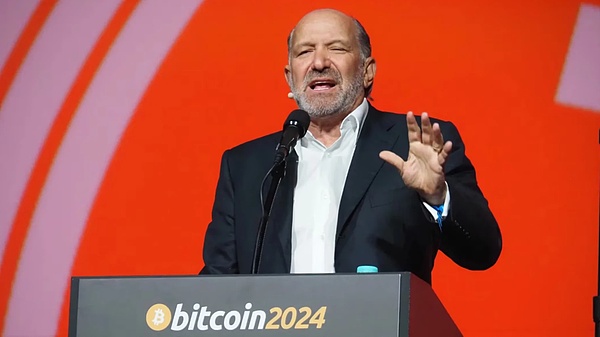
According to Coindesk, Cantor Fitzgerald not only manages Tether reserves, but also participates in U.S. Treasury bond transactions. It has announced a Bitcoin financing business of up to $2 billion to provide leverage for Bitcoin investors.
Lutnick is also a close ally of Trump and a staunch supporter of the MAGA movement. He actively raised money for Trump in the 2020 and 2024 presidential campaigns.
Previously considered a favorite for Treasury Secretary, Trump ultimately appointed Lutnick to helm the smaller Department of Commerce.
After the nomination, Lutnick expressed his gratitude on social media X, saying that he would be committed to the goal of "making America great again."
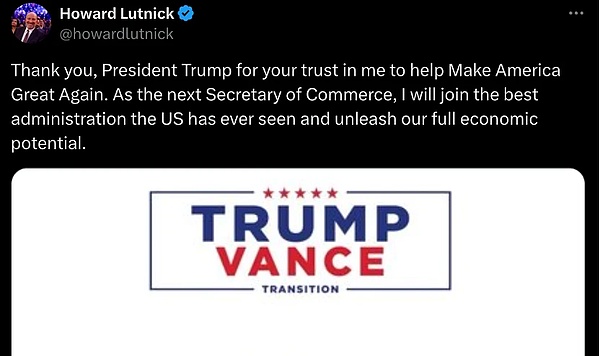
Lutnick's nomination has received support from many parties. Robert F. Kennedy Jr., the nominee for Secretary of Health, praised him on social media as "the strongest advocate of Bitcoin," and Musk also publicly supported Lutnick as Treasury Secretary.
However, if Lutnick officially takes office, he may take a tougher stance on China's trade policy. During the US election, he publicly supported a 60% tariff on Chinese goods, which may become a key issue in future Sino-US trade relations.
The appointment has been announced.
04 Musk-led "Department of Government Efficiency"
In the executive order signed by Trump on the day of his inauguration, one of the items was the announcement of the official establishment of the "Department of Government Efficiency", a cost-cutting program led by Elon Musk and Vivek Ramaswamy. The full name of the Department of Government Efficiency, or DOGE for short, is also associated with the cryptocurrency Dogecoin, which Musk has long promoted, so the relevant news has also become a weather vane for the development of Dogecoin.
The executive order defines the goals and structure of the department, including specific measures such as upgrading government IT systems and promoting the use of DOGE in government payments and technology integration.
Ramaswamy, the founder of Strive Asset Management, has an important layout in the fields of asset management and Bitcoin investment. According to a financial disclosure document in June 2023, Ramaswamy holds Bitcoin worth $100,000 to $250,000 and Ethereum worth $150,000 to $50,000. His personal investment reflects his high trust in crypto assets.

According to previous plans, this department is not a formal federal government agency in the traditional sense, but operates as an independent organization, providing policy advice to the White House and overseeing reform measures. The "Government Efficiency Department" will focus on large-scale government spending cuts, streamlining the US government's bureaucracy, and trying to streamline government bureaucracy by stripping off redundant departments and processes to save costs. As a technology giant, Musk will help promote the department's strategy and technological innovation, and Ramaswamy will play a key leadership role.
However, according to Monday's executive order, DOGE will be located within the executive department rather than operating as an external advisory committee. The executive order also announced that the White House's existing "U.S. Digital Service" (focused on improving government websites and technology) will be renamed the "U.S. DOGE Service." DOGE's core purpose is to "implement the President's DOGE agenda and maximize government efficiency and productivity by modernizing federal technology and software."
Although the executive order did not specify the specific details of spending cuts and agency restructuring, DOGE was given the important responsibility of upgrading federal IT systems.
And according to relevant news, Musk and Trump's cooperation has begun a long time ago. During the 2024 election, Musk invested more than $130 million to support Trump's campaign.
Overall, the "Department of Government Efficiency" is a controversial but also highly watched innovative policy project jointly launched by Trump and Musk. The operating model, specific goals and challenges faced by this agency deserve continued attention.
05 White House AI and Cryptocurrency Affairs Director
At the end of 2024, Trump also made a series of nominations for his Office of Science and Technology Policy (OSTP).
1) Michael Kratsios, a professor at Stanford University's AI department, was appointed director of the White House Office of Science and Technology Policy. At the same time, he was also appointed as the President's Science and Technology Assistant to the incoming Trump administration, providing advice to David Sacks, the "artificial intelligence and cryptocurrency czar."
Kratz is a researcher at the Stanford Human Centered Artificial Intelligence Institute (Stanford HAI). Before serving as the director of the White House Office of Science and Technology Policy, he was a science and technology official in the first Trump administration. He served in the Department of Defense and the Department of Engineering. He has an important say in the various R&D budgets and projects of the Ensuring Department of Defense. He has doubled the federal AI and quantum research funding and won the Department of Defense Civilian Outstanding Service Award and the Fortune 40 Elite Under 40.
In addition, Kratz also led the formulation of the United States' first artificial intelligence strategy and the formulation of the world's first AI development regulatory principles, which set a new benchmark for the United States in technological innovation.
2) Crypto Tsar
In early December 2024, David Sacks was nominated to serve as the President's Advisor on Artificial Intelligence and Cryptocurrency, and served as co-chair of PCAST (the abbreviation of the Presidential Council of Advisors on Science and Technology).
This is a new position focused on encryption policy, the first of its kind in the White House. This newly created position also highlights Trump's intention to promote the rapid development of the two industries. Trump posted on his social media site Truth Social: "In this important role, Sachs will guide the government's policies on artificial intelligence and cryptocurrency, two areas that are critical to America's future competitiveness, and Sachs will work to make the United States a global leader in these two areas."
It is worth mentioning that Sachs is a close friend of Musk. He served as an executive with Musk in the early days of PayPal and was one of Musk's investors in the $44 billion acquisition of Twitter. According to media reports, in April 2024, Musk and Sachs hosted a billionaire dinner with the theme "Against Biden."
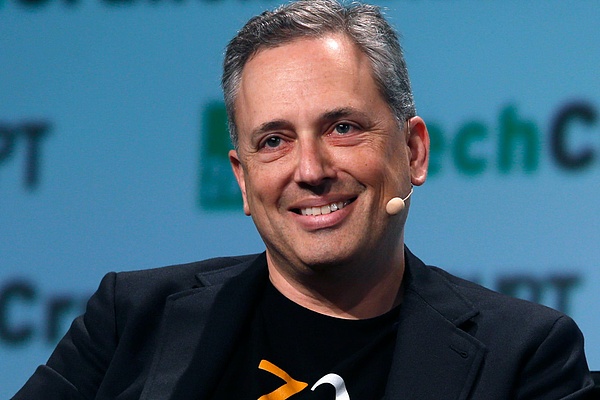
As a veteran technology entrepreneur, Sachs rose to fame in his early years for his participation in the development of PayPal and was an early Silicon Valley entrepreneur.He also founded his own venture capital firm Craft Ventures, which has invested in well-known companies such as Airbnb, Palantir and Slack, has also been involved in the encryption field, investing in encryption companies such as BitGo and Bitwise.
In addition, Sachs is the co-host of the famous podcast "All In". In recent years, he has expressed his support for Trump through the platform and actively participated in discussions on economic policies related to technology. According to media reports, Sachs played a key role in helping Trump raise funds from donors in the technology industry, raising about $12 million for Trump's campaign team, showing that he has a great influence in the encryption and technology community.
However, the specific responsibilities are still not disclosed.
3) A16z's corner
On December 22, 2024, US President Donald Trump announced on the social media platform Truth Social that Scott Kupor, the first employee and managing partner of a16z, was appointed as the Office of Personnel Management, Kupper will take over the entirety of OPM, responsible for recruitment coordination and resource support, and work closely with the Department of Government Efficiency (DOGE). He said on social media X that he would take "efficiency" as the core principle of the federal government and promote the modernization of government agencies. According to Trump, Kupper is one of the founding team members of a16z, served as chairman of the National Venture Capital Association (NVCA), and played an important role in the development of a16z. According to the official website of a16z, Kupper helped the company grow from managing $300 million in assets to more than $40 billion. He also wrote the best-selling book "Secrets of Sand Hill Road: Venture Capital and How to Get It". Sand Hill Road is located in Menlo Park, California, and is famous for its Silicon Valley venture capital institutions. Apple, Microsoft, Amazon and other technology giants have obtained founding funds from this place.
On December 23, 2024, Trump announced that another partner of a16z, Sriram Krishnan, was nominated as a senior policy advisor for artificial intelligence in the White House Office of Science and Technology Policy (OSTP).
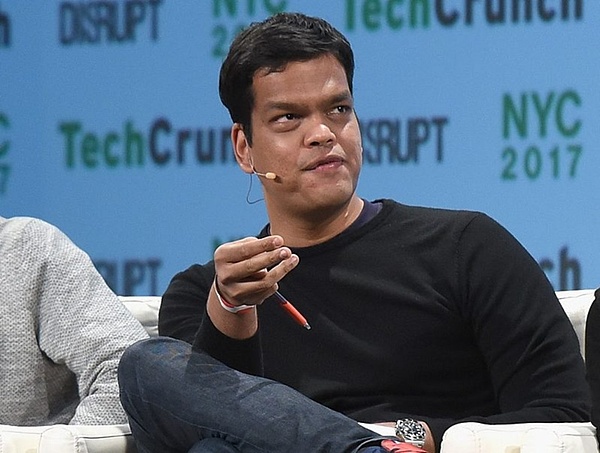
Krishnan is a senior leader in the technology industry. Before joining a16z, he served as the head of the product and engineering team at companies such as X (formerly Twitter), Meta and Snap, and has accumulated rich experience in companies such as Microsoft, Yahoo and Facebook.
Trump said Krishnan will work closely with David Sacks, the president's adviser on artificial intelligence and cryptocurrency, to ensure the United States' global leadership in the field of artificial intelligence.
Overall, these appointments show that the current Trump administration attaches much more importance to technology policy than his previous term. In the previous term, the confirmation of the director of OSTP was delayed for more than two years, and this time the team is in place at a significantly faster speed.
Among these positions, except for Kratsios' nomination, which needs to be approved by the Senate before he can take up his full-time position, other senior positions can start work immediately after the new government is sworn in on January 20.
06 The Commissioner of the Internal Revenue Service who firmly holds Bitcoin
The Internal Revenue Service is responsible for collecting and managing federal taxes and ensuring that tax laws are enforced. Related to cryptocurrencies, it may regulate the tax declaration of cryptocurrencies, requiring transactions, income, investment income, etc. of crypto assets to be reported and taxed in accordance with the law to ensure tax compliance.
On November 12, 2024, Trump announced the nomination of Pete Hegseth, a Fox News host and former combat soldier, as U.S. Secretary of Defense. According to relevant news, Hegseth insists on the decentralized value of Bitcoin and promises not to sell Bitcoin.
In December 2024, it was reported that President-elect Trump hopes to cancel all capital gains taxes on cryptocurrencies issued by U.S. companies. As soon as the news came out, crypto assets such as ADA, ALGO, XRP and HBAR created by U.S. companies all rose. So now, when Hegseth will take office and whether all profits earned by these companies can be completely tax-free, it will take time to verify.
07 Crypto-friendly Speaker of the House
On November 4, 2024, Trump-backed Republican Congressman Mike Johnson was successfully re-elected as Speaker of the House. Johnson is a crypto-friendly person. He previously voted in favor of the 21st Century Financial Innovation and Technology Act (commonly known as FIT21) and the Anti-Central Bank Digital Currency (CBDC) Act. The former aims to provide a regulatory framework for digital assets and related technologies, and the latter is mainly to support decentralized financial innovation.
Industry media are reporting that with Johnson's reelection, cryptocurrency-friendly members of Congress are likely to promote cryptocurrency legislation in 2025. However, according to foreign media, Johnson's position on cryptocurrency is not entirely clear. Some media reports say that he may not make crypto regulation a priority.
In general, Johnson's reelection may provide new impetus for cryptocurrency legislation, but its specific impact will depend on the actions of him and other members of Congress in future policy-making.
08 Chair of the Digital Assets Group that proposed the Bitcoin Act
On January 23, Senator Cynthia Lummis was appointed as the Chair of the Senate Banking Digital Assets Subcommittee.
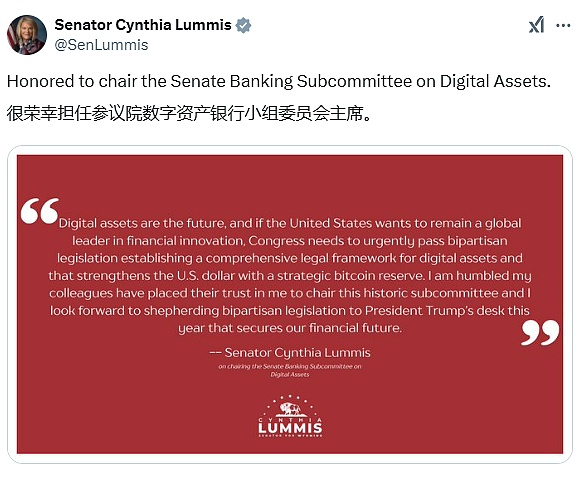
Lummis, a Republican senator, has attracted much attention in the American political arena for her firm support for cryptocurrencies and bold proposals.She is not only the first member of the Senate to publicly admit that she owns Bitcoin, but she is also known as the "Crypto Queen" and "Bitcoin Senator" for proposing the "Promoting Innovation, Technology and Competitiveness through National Optimization Investment Act" (referred to as the "Bitcoin Act"). Under her promotion, Bitcoin, a disruptive technology, is moving from a private investment tool to a national strategic reserve.
As the first member of the Senate to publicly hold Bitcoin, Lummis' support for Bitcoin began with personal investment and gradually extended to policy proposals. She believes that Bitcoin is an effective tool to deal with inflation and protect personal financial freedom, and even publicly called for the "urgent passage" of Bitcoin strategic reserve legislation.
In July 2024, Lummis proposed the Bitcoin Act, advocating the establishment of a US strategic Bitcoin reserve to strengthen the strength of the US dollar and deal with inflation. The proposal aims to provide innovative solutions to the US fiscal system by purchasing and reserving Bitcoin, mainly including the following key measures:
1) Establish a secure Bitcoin reserve network
The US Treasury Department operates a decentralized Bitcoin vault network to ensure the highest level of physical and cybersecurity for the country's Bitcoin holdings.
2) Large-scale purchase of Bitcoin
Plans to purchase 1 million Bitcoins within five years, accounting for 5% of the total supply of Bitcoin, which is equivalent to the size of US gold reserves, and set a minimum holding period of 20 years.
3) Transparency of funding sources
The purchase of Bitcoin will be achieved by dispersing existing funds within the Federal Reserve System and the Treasury Department, rather than adding new fiscal burdens.
4) Respect for personal financial freedom
Explicitly support the self-custody rights of private Bitcoin holders to ensure that the national strategic reserve does not infringe on personal property freedom.
Previously, Lummis's proposal had sparked widespread discussion in Congress due to its forward-looking and controversial nature. Supporters believe that Bitcoin, as a means of storing value, can enhance the U.S. balance sheet and provide innovative solutions to the national debt problem. However, opponents question the volatility of Bitcoin and its potential risks to national security.
Despite this, Lummis did not back down, and now that she has been successfully elected today, she should push the bill again. If this proposal is promoted, it may provide support for the future development of the crypto industry and have a profound impact on Bitcoin's market position.
09 Summary
It can be seen that after the election, Trump is actively nominating cryptocurrency-friendly executives to important positions. At present, Trump 2.0 is on the road to fulfilling his vows of "Crypto Capital" and "Bitcoin Superpower".
However, Trump's extensive layout in the field of encryption has also aroused doubts from the outside world about the abuse of power for personal gain. According to market news, Trump's move as a presidential candidate to launch his personal Memecoin and support the encryption platform (World Liberty Financial) conflicts with his political responsibilities.
Some experts also remind investors to be vigilant, "Although Trump's support may bring short-term benefits, whether it is conducive to the long-term development of the cryptocurrency industry still needs to observe the specific implementation of the policy."
Can the "golden age" of cryptocurrency arrive smoothly as scheduled? Let's wait and see.
 Joy
Joy


 Atkins worked in securities issuance and mergers and acquisitions at a New York law firm. He joined the U.S. Securities and Exchange Commission (SEC) in 1990 and assisted several chairmen in formulating important regulations involving corporate governance, shareholder rights and capital market access. He has extensive legal and regulatory experience.
Atkins worked in securities issuance and mergers and acquisitions at a New York law firm. He joined the U.S. Securities and Exchange Commission (SEC) in 1990 and assisted several chairmen in formulating important regulations involving corporate governance, shareholder rights and capital market access. He has extensive legal and regulatory experience. Bessant, 63, graduated from Yale University with a degree in political science. During college, he studied macroeconomics and financial instruments in depth. After graduation, he quickly emerged and served as the chief investment officer of Soros Fund Management. He has rich experience in market transactions and economic policy consulting. As a financial expert who publicly supports cryptocurrencies, Bessant has repeatedly called cryptocurrencies "an indispensable part of the future of finance." In an interview with Fox Business Channel in early 2024, he said: "Cryptocurrency represents freedom, and the crypto economy will continue to exist." He particularly emphasized that the most attractive thing about Bitcoin is that it attracts young people and people who have not participated in the market before. He believes that cultivating market culture and establishing a system that is more suitable for the masses is the core of capitalist development.
Bessant, 63, graduated from Yale University with a degree in political science. During college, he studied macroeconomics and financial instruments in depth. After graduation, he quickly emerged and served as the chief investment officer of Soros Fund Management. He has rich experience in market transactions and economic policy consulting. As a financial expert who publicly supports cryptocurrencies, Bessant has repeatedly called cryptocurrencies "an indispensable part of the future of finance." In an interview with Fox Business Channel in early 2024, he said: "Cryptocurrency represents freedom, and the crypto economy will continue to exist." He particularly emphasized that the most attractive thing about Bitcoin is that it attracts young people and people who have not participated in the market before. He believes that cultivating market culture and establishing a system that is more suitable for the masses is the core of capitalist development. 











